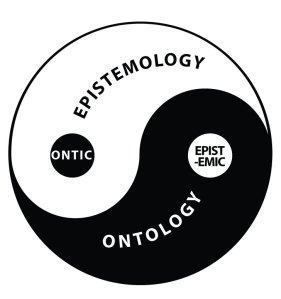
I attended the first BUSN8018 lecture today, and Professor Kerry Jacobs introduced us to ontology, epistemology, and methodology - which can be differentiated by the following principal questions:
Ontology - what is real?
"Is there a real world out there that is independent of our knowledge of it?" (Marsh and Furlong, 2002)
"What is out there to know about it?" (Grix, 2002)
"What is the form and nature of reality and, therefore, what is there that can be known about it?" (Guba and Lincoln, 1994)
Professor Jacobs: Is God real? / Are black holes real? / Is society real? / Are you real? / What are the objects we can study?
Epistemology- how do you know?
An epistemological position reflects the "view of what we can know about the world and how we can know it" (Marsh and Furlong, 2002).
"What and how can we know about it?" (Grix, 2002)
"What is the nature of the relationship between the knower or would-be knower and what can be known?" (Guba and Lincoln, 1994)
Professor Jacobs: How do you know if God is real? / How do you know if your boyfriend is sleeping with someone else?
Methodology - what is the evidence or proof?
"...ways of determining knowledge or reality" (Guba, 1990)
"...ways of generating and justifying knowledge" (Blaikie, 2003)
"How can the inquirer go about finding out whatever he or she believes can be known?"
(Guba and Lincoln, 1994)
Professor Jacobs: How can we find out if God is real? / How can we prove it? / What is acceptable evidence? / How would you go about convincing someone that it is true? / Why and how?
Researchers usually begin their research with an understanding of ontology, followed by epistemology, and finally, methodology. It seems pretty logical to me that this should be the case. Ontology should come first because it establishes the underlying assumptions and beliefs about 'the reality'. Epistemology then goes on to define how we can know and reason that reality. In many cases, epistemologists have to assume that findings from ontology are true before they start to make arguments about knowledge.
In my opinion, anyone undertaking research should be clear about his ontological and epistemological position before proceeding with a research topic, otherwise, confusion and contradiction will arise as he progresses further on his research topic. After which, the methodology for the research topic will naturally come about. In a nutshell, a researcher's epistemological approach is a result of his ontological view, which in turn influences his choice of methodology.
Ontology vs Epistemology

Personally, I find it a little hard to recognise the differences between ontology and epistemology. But I found that taking a closer look at their definitions -
"Ontology" is a combination of the Greek words "onto-" and "-logos", which mean "being" and "study" respectively. Put simply, ontology is the study of the nature of being. It usually answers the question "what" as it is concerned with identifying the types of objects that actually exist.
On the other hand, "epistemology" is a combination of the Greek words "epistēmē" and "-logos", which mean "knowledge" and "study" respectively. In other words, epistemology is the study of knowledge. It answers the questions "how" and "what", as it is concerned with the nature of knowledge, its related possibilities and scope.has given me a better understanding of both concepts.
I agree that a researcher's ontological position is important prior to any research, however isn't it difficult for one to form that position since it isn't clear what there actually is - i.e. Is God real? Anyway I really like your last part where you provided the definitions for ontology and epistemology.
ReplyDeleteAnyway great post! Keep it up!
ReplyDeleteObviously, you've read a lot. Personally, a easier understanding is:
ReplyDelete1) Ontology is the target that the research is going to achieve.
2) Epistemology is the theoretical framework that support ontology.
3) Methodology is the method that is used to prove whether the ontology is right or wrong based on epistemology.
This article really provides those green hand (like me!) to get to know some logical threads or flows behind a good research. It follows the order from ontology - epistemology - methodology.
ReplyDeleteI think an inquisition into the 'nature of being' or 'what is real' can either stem from your curiosity or doubts after gaining certain degree of knowledge. That is the way people develop and evolve because there's no absolute right or wrong in the world I suppose.
Then it comes to the question how you're studying or researching. When you're seriously thinking about the problem in your head, you'll try to dig out the answer. It may have been answered by someone else or no one knows about it. Is that person's answer right? Is there anyway I can find out the answer? Keep asking yourself these questions and take the initiative to explore.
I guess epistemology should be the hardest part especially when you first started. HOW itself is tough to explain anyway.
I'd like to know more about the methodology part as well, in terms of how qualitative it can be?
Could ontology be your assumptions held over time whilst epistemology means how you formulated the assumptions resulting in your methodology e.g action research and methods quantitative and qualitative methods in order to answer your research question ? Elizabeth
Delete